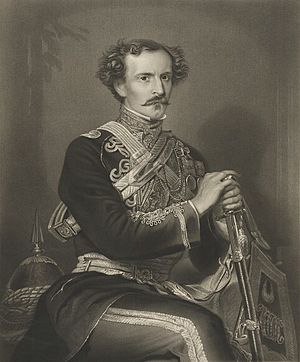William Mayne (officer) facts for kids
Quick facts for kids
William Mayne
ADC
|
|
|---|---|

William Mayne, mezzotint by George Salisbury Shury after a portrait by Karl Hartmann
|
|
| Born | 28 October 1818 Limpsfield, Surrey |
| Died | 23 December 1855 (aged 37) Cairo, Egypt |
| Allegiance | |
| Service/ |
Army of the Indus Bengal Army |
| Rank | Colonel |
| Unit | 37th Bengal Infantry Regiment |
| Commands held | Hyderabad Contingent |
| Battles/wars | First Afghan War Gwalior campaign Hyderabad conflicts |
William Mayne (1818–1855) was a brave English army officer. He served the East India Company, a powerful British trading company that also had its own army in India. Mayne became famous for his actions during the First Afghan War, especially in the defense of Jellalabad. He rose to the rank of colonel in the Bengal Army and briefly led the Hyderabad contingent.
Early Life and Military Start
William Mayne was born on October 28, 1818, in Limpsfield, Surrey, England. He was the second son of Robert Mayne.
In 1836, William joined the East India Company's Military Seminary. This was a special school where young men trained to become officers for the company's army. After finishing his training, he became an ensign in 1837. He was first assigned to the 4th Bengal Native Infantry.
Adventures in Afghanistan
In 1838, Mayne joined the 37th Bengal Infantry. This unit was part of the Army of the Indus, which was involved in the First Anglo-Afghan War. Mayne quickly showed his courage. He was recognized for his actions during an attack on the fort of Julgar in 1840.
He became a lieutenant in 1841. During the famous defense of Jellalabad, he commanded a squadron of cavalry. His bravery during this siege was noticed by many. Later, he also served with General Pollock and helped capture Istalif in 1842. Because of his excellent service, he was chosen to be the adjutant of the Governor-General's bodyguard.
Service in India
In 1843, while serving with the bodyguard, Mayne fought in the Battle of Maharajpore. He was not involved in the Sikh Wars, as he was commanding other units at the time.
In 1851, Mayne was specially chosen to lead the forces of the Nizam (ruler) of Hyderabad. He commanded about six thousand troops. His job was to stop local disturbances in the Deccan region. Mayne was known for his fast movements and successful operations. He was praised many times by the Governor-General of India.
One notable event happened in 1853 when he defeated a large group of Arabs near Aurungabad. In 1854, while surrounding the fort of Saila, he defeated a group of Rohillas who tried to break through his lines at night.
Final Years
Mayne returned to England at the end of 1854. He was promoted to brevet-colonel and became an ADC (a special assistant) to Queen Victoria.
He soon returned to India, but became very ill with dysentery. He had to go home again for his health. Sadly, William Mayne died in Cairo, Egypt, on December 23, 1855, at the age of 37. He was married to Helen Cunliffe and had one child.
 | Janet Taylor Pickett |
 | Synthia Saint James |
 | Howardena Pindell |
 | Faith Ringgold |

